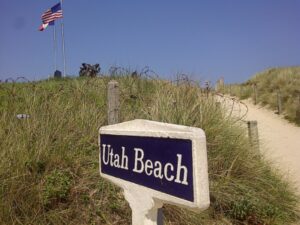 How things start is usually how they end. And so it was with the Third Reich. On September 1, 1939, the Nazis invaded Poland in a cataclysmic assault. Their defeat in the conflagration of the battle of Normandy in June, 1944, was the beginning of their end.
How things start is usually how they end. And so it was with the Third Reich. On September 1, 1939, the Nazis invaded Poland in a cataclysmic assault. Their defeat in the conflagration of the battle of Normandy in June, 1944, was the beginning of their end.
We stood on Point du Hoc gazing out across the vast slate sea, the wind and sand whipping around us in cold blasts, drowning out all but the screeching gulls. The Normandy Coast, in northwest France along the English Channel, was the spot at which the largest sea invasion in the history of man had taken place, where the Allied Forces began the assault on Nazi-occupied Europe. These few miles of beach and cliff, this raw broken land, was the place countless thousands had perished.
In the water of the Channel were still a few Mulberries, the hollow floating barges that had formed a breakwater of safety for the men coming ashore. On land there were still pits the size of small office buildings, 40 or 60 feet deep and wider across, remnants of the massive shells fired from the Allied ships. A few Nazi bunkers were scattered across the plateau, their concrete walls 6 feet thick, built with a thin gash facing the sea to shoot rifles, the turrets on top with their steel tracks for the huge guns, long gone, all installed as part of Hitler’s Atlantic Wall.
No one spoke, so lost in our own reveries, our own histories about the landing. Only one of us had been alive during that cataclysm but we had all heard the stories from fathers and grandfathers, stories that made each of us cold and more isolated.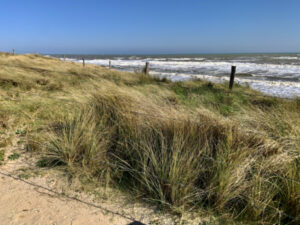
The assault had begun on June 6, 1944, in rainy, windy, cold weather. Hitler’s guesses had been wrong about when and where the Allied attack would start, convinced that it would happen at Calais, France, a few dozen miles from Normandy, as that was the narrowest spot of the Channel between England and France and had a ready harbor. Instead, the Allies had chosen Normandy which had no harbor. Still, the German fortifications at Normandy were powerful, modern and manned by 50,000 German troops, many more than the Allies had expected. Nevertheless the Germans must have been scared witless when they saw the flotilla of nearly 7,000 Allied ships come over the horizon that morning, a tsunami of the most powerful ships in the world descending upon them.
In one of the bunkers there were metal doors with names scratched on them, visible after more than 70 years, names of the men who had manned the heavy guns on top or fired the high powered rifles through the gash. Many died in the bunkers, some by flamethrowers that turned them into fried meat, roasting in an oven of incandescence. Others died of asphyxiation when all the oxygen had been sucked out. They died shitting their pants, pissing themselves, if they lived that long.
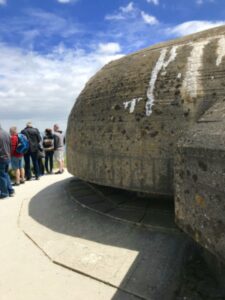 One of the names scratched into the door was Gerhardt. By that June day, he must have known that the war was lost, especially since the terrible German defeat at Stalingrad. He might even have questioned Hitler’s directives and increasingly demented military orders. If he was a grunt soldier, he probably didn’t know about the Final Solution and the number of Jews who had already died in the name of racial purity. In his heart of hearts he might not have contemplated these matters even if he had known. No questions means no guilt, no reflection means no bad conscience. Even if he had known of the atrocities the Nazis had committed, it’s doubtful he or any of the young men would have taken up arms against the regime or questioned the Fuhrer: Any doubt, even a hint or a whisper, would have landed them in a concentration or death camp. They could not allow themselves even a small cataract of dissent.
One of the names scratched into the door was Gerhardt. By that June day, he must have known that the war was lost, especially since the terrible German defeat at Stalingrad. He might even have questioned Hitler’s directives and increasingly demented military orders. If he was a grunt soldier, he probably didn’t know about the Final Solution and the number of Jews who had already died in the name of racial purity. In his heart of hearts he might not have contemplated these matters even if he had known. No questions means no guilt, no reflection means no bad conscience. Even if he had known of the atrocities the Nazis had committed, it’s doubtful he or any of the young men would have taken up arms against the regime or questioned the Fuhrer: Any doubt, even a hint or a whisper, would have landed them in a concentration or death camp. They could not allow themselves even a small cataract of dissent.
All ideology would have been gone that June morning, all the fine Nuremberg rallies and goose stepping parades down Unter den Linden Strasse in Berlin, time spent in the Hitler Youth, the endless propaganda of Goebbels convincing them of their cultural superiority, all the slogan yelling and hyperbole of Hitler’s fantastical speeches. All that would have been gone by then as they looked out to sea at the largest armada in history. Their final singular thought must have been just survival.
If Gerhardt came through it and didn’t become a smoldering black gelatinous mass on the floor of the bunker, I speculated what would have happened to him. Probably he would have become an American POW, or maybe British. He would have been held for 2 or 3 years, undergoing some type of re-eduction or De-Nazification as it was called. Some remained loyal, secretly, to the so-called ‘cause’ but most of the other German soldiers I’ve met, and I’ve known many, had little or no Nazi left in them.
The American Rangers, on average 6 years younger than their German counterparts, scaled that 100+ foot 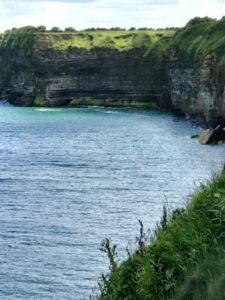 cliff at Point du Hoc as the Germans fired point blank straight down at them, like shooting fish in a barrel. Yet the Rangers kept coming up those shaky rope ladders and eventually made it onto the escarpment. The Germans were likely fighting for their own lives that day at Normandy, no longer for a cult figure, for glory, for conquest, for the Reich or for a smothering and deadly ideology. The Americans were perhaps fighting not for their own lives but for something else, an idea, a belief that people have rights, can dissent, and vote, and decide for themselves, as messy and slow as that is, and occasionally unfair and awkward. Churchill said that democracy was the worst form of government except for all the others. The American kids storming that beach and climbing those cliffs may not have known those words but the idea was in their hearts and they were willing to sacrifice their own lives for that idea, an idea greater than themselves.
cliff at Point du Hoc as the Germans fired point blank straight down at them, like shooting fish in a barrel. Yet the Rangers kept coming up those shaky rope ladders and eventually made it onto the escarpment. The Germans were likely fighting for their own lives that day at Normandy, no longer for a cult figure, for glory, for conquest, for the Reich or for a smothering and deadly ideology. The Americans were perhaps fighting not for their own lives but for something else, an idea, a belief that people have rights, can dissent, and vote, and decide for themselves, as messy and slow as that is, and occasionally unfair and awkward. Churchill said that democracy was the worst form of government except for all the others. The American kids storming that beach and climbing those cliffs may not have known those words but the idea was in their hearts and they were willing to sacrifice their own lives for that idea, an idea greater than themselves.
Herb, one of us, had not been at Normandy, in fact had not been in the European theater of war but instead at every major battle of the South Pacific including Midway and Guam. He was in his 90s, still tall, straight, strong and quiet. Someone had convinced him to wear his US Marine WWII Veteran cap the day we visited Normandy. On that cliff of Point du Hoc he was unexpectedly surrounded by a group of Germans, a large family who had come to Normandy to see where their grandfather had died. One of the granddaughters saw the cap and came up to Herb, asked him in English if he had been at Normandy in 1944 but before he could answer she put her arms around him, hugged him, and sobbed, as did the rest of her family. They told him how grateful they were, that they would not have the country they do today without people like him. Tears rolled down Herb’s cheeks but he said little, just soothed them, said it was an honor.
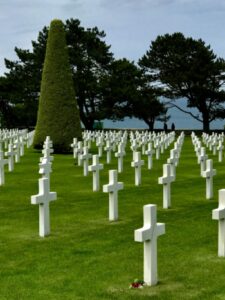 We went from the beaches to the American Cemetery, some 200 feet above the sea. On a low hill stands an open air monument to the assault on D-Day and fanning out from there are rolling fields of endless green with 10,000 perfectly aligned matching white marble cemetery markers. 10,000. It seems endless. The ones at the far end appear only as tiny white dots on the green. The aching sacrifice of those men, of their families, seems like it would drown out the tranquility of the place but it doesn’t. It is peaceful, calm, solemn, the grandest cathedral of all. A tribute to the selflessness of some for the benefit of all, transfixing, indelible and redemptive.
We went from the beaches to the American Cemetery, some 200 feet above the sea. On a low hill stands an open air monument to the assault on D-Day and fanning out from there are rolling fields of endless green with 10,000 perfectly aligned matching white marble cemetery markers. 10,000. It seems endless. The ones at the far end appear only as tiny white dots on the green. The aching sacrifice of those men, of their families, seems like it would drown out the tranquility of the place but it doesn’t. It is peaceful, calm, solemn, the grandest cathedral of all. A tribute to the selflessness of some for the benefit of all, transfixing, indelible and redemptive.
The conflagration that the Third Reich had begun in September, 1939, consumed it in the end. Victory at Normandy was the key.
